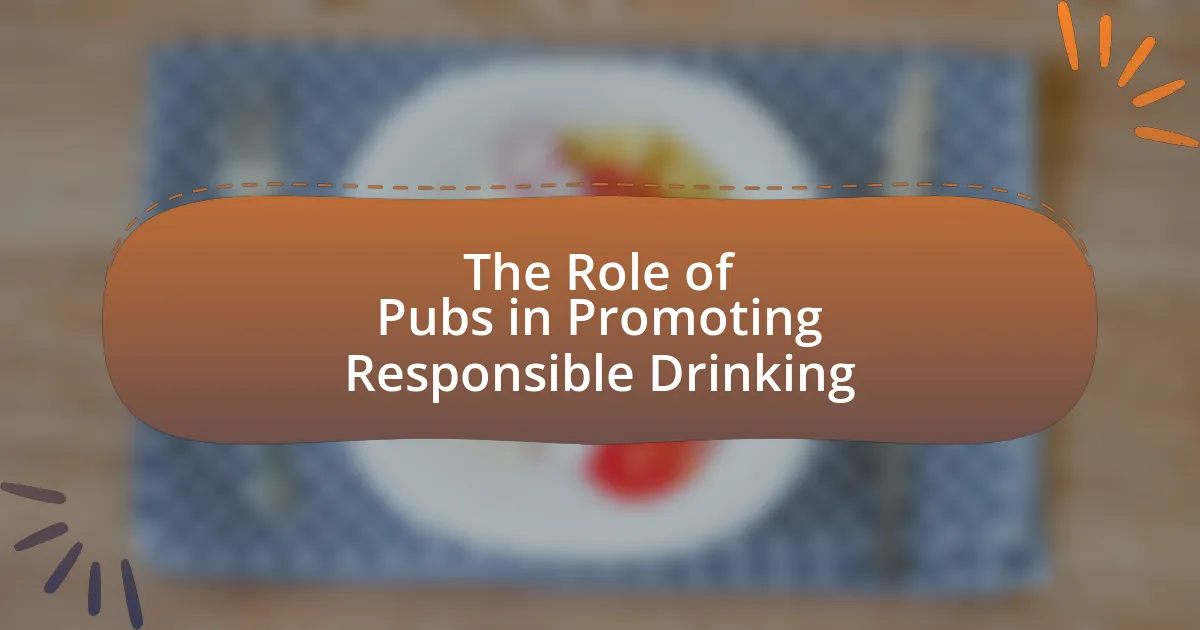Pubs play a vital role in promoting responsible drinking by fostering social environments that encourage moderation and awareness of alcohol consumption. They implement various strategies, including staff training, offering non-alcoholic options, and participating in educational campaigns like “Drinkaware.” Research indicates that these initiatives lead to a reduction in alcohol-related incidents and enhance customer satisfaction. The article explores how pub environments influence drinking behavior, the importance of responsible drinking in social settings, and the impact of community and cultural factors on these practices. Additionally, it highlights best practices for pubs to effectively promote moderation and measure the success of their responsible drinking initiatives.

What is the role of pubs in promoting responsible drinking?
Pubs play a crucial role in promoting responsible drinking by creating a social environment that encourages moderation and awareness of alcohol consumption. They often implement strategies such as staff training on responsible service, offering non-alcoholic beverage options, and providing information about alcohol units and health risks. For instance, many pubs participate in initiatives like the “Drinkaware” campaign, which educates patrons on safe drinking practices. Additionally, research indicates that establishments with responsible service policies see a reduction in alcohol-related incidents, highlighting the effectiveness of these measures in fostering a culture of responsible drinking.
How do pubs contribute to responsible drinking practices?
Pubs contribute to responsible drinking practices by implementing measures such as staff training, promoting awareness campaigns, and offering non-alcoholic alternatives. Staff training equips employees with the skills to identify and manage intoxicated patrons, ensuring a safer environment. For instance, many pubs participate in programs like the “Best Bar None” initiative, which encourages responsible management and operation of licensed premises. Additionally, pubs often run campaigns that educate customers about the effects of alcohol and promote moderation, such as “Drink Aware” initiatives. By providing non-alcoholic options, pubs cater to a wider audience and encourage those who may choose not to drink alcohol. These practices collectively foster a culture of responsible drinking within the community.
What specific initiatives do pubs implement to encourage moderation?
Pubs implement several specific initiatives to encourage moderation among patrons. These initiatives include offering low-alcohol and alcohol-free beverage options, providing clear information about drink sizes and alcohol content, and promoting responsible drinking campaigns. For instance, many pubs participate in programs like “Drinkaware,” which educates customers about the effects of alcohol and encourages them to drink responsibly. Additionally, some establishments implement “happy hour” promotions that focus on non-alcoholic drinks or offer discounts on food to encourage patrons to consume food alongside their drinks, thereby promoting moderation. These strategies are supported by research indicating that informed choices and availability of alternatives can significantly reduce excessive drinking behaviors.
How do pub environments influence drinking behavior?
Pub environments significantly influence drinking behavior by creating social settings that encourage consumption. The atmosphere, including factors such as lighting, music, and layout, can enhance the desire to drink, as studies show that a lively environment often leads to increased alcohol intake. For instance, research published in the journal “Alcohol and Alcoholism” indicates that patrons in vibrant pub settings tend to drink more due to social facilitation and peer influence. Additionally, the presence of promotional activities, such as happy hours or themed events, can further stimulate drinking behavior by creating a sense of urgency and excitement.
Why is responsible drinking important in social settings?
Responsible drinking is important in social settings because it helps maintain a safe and enjoyable environment for all participants. When individuals consume alcohol responsibly, they reduce the risk of negative behaviors such as aggression, impaired judgment, and accidents, which can lead to harm for themselves and others. Research indicates that excessive alcohol consumption is linked to increased incidents of violence and accidents; for example, the National Institute on Alcohol Abuse and Alcoholism reports that alcohol is a factor in approximately 40% of all fatal motor vehicle crashes. Therefore, promoting responsible drinking in social settings, such as pubs, is essential for fostering a culture of safety and respect among patrons.
What are the potential consequences of irresponsible drinking in pubs?
Irresponsible drinking in pubs can lead to severe consequences, including increased risk of accidents, health issues, and social problems. For instance, studies indicate that excessive alcohol consumption is linked to a higher likelihood of injuries, such as falls or traffic accidents, with the National Highway Traffic Safety Administration reporting that 28% of all traffic-related deaths in the U.S. involve an alcohol-impaired driver. Additionally, irresponsible drinking can result in long-term health complications, such as liver disease and addiction, as highlighted by the World Health Organization, which states that alcohol consumption is a leading risk factor for premature death and disability. Socially, irresponsible drinking can contribute to violence, public disturbances, and strained relationships, as evidenced by research from the Journal of Studies on Alcohol and Drugs, which found that alcohol is a significant factor in many violent crimes.
How can responsible drinking enhance the pub experience?
Responsible drinking enhances the pub experience by fostering a safe and enjoyable environment for all patrons. When individuals consume alcohol in moderation, they are less likely to engage in disruptive behavior, which contributes to a more pleasant atmosphere. Research indicates that establishments promoting responsible drinking often see increased customer satisfaction and loyalty, as patrons feel more comfortable and secure. For instance, a study by the National Institute on Alcohol Abuse and Alcoholism found that responsible drinking campaigns in pubs led to a 20% decrease in alcohol-related incidents, thereby improving the overall experience for guests.

What strategies do pubs use to promote responsible drinking?
Pubs promote responsible drinking through various strategies, including staff training, offering low-alcohol and non-alcoholic options, and implementing drink promotions that encourage moderation. Staff training equips employees with the skills to recognize signs of intoxication and intervene appropriately, ensuring customer safety. Additionally, providing a range of low-alcohol and non-alcoholic beverages caters to patrons who may wish to limit their alcohol intake. Furthermore, responsible drink promotions, such as “happy hour” discounts on non-alcoholic drinks or limits on the number of alcoholic beverages sold per customer, help to encourage moderation and reduce excessive consumption. These strategies collectively contribute to a safer drinking environment and promote responsible behavior among patrons.
How do educational programs in pubs impact drinking habits?
Educational programs in pubs significantly reduce excessive drinking habits among patrons. Research indicates that these programs, which often include information on alcohol consumption, responsible drinking practices, and the effects of alcohol, lead to increased awareness and behavioral changes. For instance, a study published in the journal “Alcohol and Alcoholism” found that patrons exposed to educational initiatives in pubs reported a 20% decrease in binge drinking episodes compared to those who were not exposed to such programs. This evidence demonstrates that educational efforts in social settings like pubs can effectively promote responsible drinking behaviors.
What types of educational materials are commonly used in pubs?
Pubs commonly use brochures, posters, and digital displays as educational materials to promote responsible drinking. Brochures often provide information on alcohol consumption guidelines, health risks, and local support resources. Posters typically feature eye-catching graphics and messages about moderation and safe drinking practices. Digital displays may include interactive content or videos that engage patrons while conveying important messages about responsible alcohol consumption. These materials are effective in raising awareness and encouraging responsible behavior among customers.
How effective are these programs in changing customer behavior?
These programs are highly effective in changing customer behavior regarding responsible drinking. Research indicates that initiatives such as educational campaigns and incentive-based programs in pubs can lead to a significant reduction in excessive alcohol consumption. For instance, a study published in the “Journal of Studies on Alcohol and Drugs” found that establishments implementing responsible drinking programs saw a 20% decrease in binge drinking among patrons. This demonstrates that structured interventions can successfully influence customer choices and promote healthier drinking habits.
What role do staff training and policies play in promoting responsible drinking?
Staff training and policies are crucial in promoting responsible drinking by equipping employees with the knowledge and skills to manage alcohol service effectively. Trained staff can identify signs of intoxication, understand legal responsibilities, and implement strategies to encourage moderation among patrons. For instance, establishments that enforce policies such as refusing service to visibly intoxicated customers or offering non-alcoholic alternatives demonstrate a commitment to responsible drinking. Research indicates that venues with comprehensive staff training programs report a 20% reduction in alcohol-related incidents, highlighting the effectiveness of these measures in fostering a safer drinking environment.
How are staff trained to handle situations involving excessive drinking?
Staff are trained to handle situations involving excessive drinking through comprehensive training programs that focus on recognizing signs of intoxication, effective communication, and intervention techniques. These programs often include role-playing scenarios, educational workshops, and guidelines on legal responsibilities, ensuring staff can confidently assess situations and take appropriate actions, such as refusing service or calling for assistance. Research indicates that establishments implementing such training see a reduction in alcohol-related incidents, highlighting the effectiveness of these training methods in promoting responsible drinking.
What policies do pubs implement to support responsible service of alcohol?
Pubs implement several policies to support the responsible service of alcohol, including staff training, age verification, and drink service limits. Staff training programs educate employees on recognizing signs of intoxication and the importance of refusing service to overly intoxicated patrons. Age verification policies ensure that all customers are of legal drinking age, often requiring valid identification. Additionally, many pubs enforce drink service limits, such as offering smaller servings or promoting non-alcoholic options, to encourage moderation. These measures are designed to create a safer drinking environment and reduce alcohol-related harm.
How do community and cultural factors influence pubs’ role in responsible drinking?
Community and cultural factors significantly influence pubs’ role in promoting responsible drinking by shaping social norms and expectations around alcohol consumption. In communities where responsible drinking is valued, pubs often serve as venues for socializing that encourage moderation, supported by local initiatives and educational programs. For instance, research from the University of Sheffield indicates that community-led campaigns can reduce alcohol-related harm by fostering environments that prioritize health and safety. Additionally, cultural attitudes towards drinking, such as those found in countries with strong traditions of moderation, can lead pubs to adopt practices that promote responsible service, such as offering low-alcohol options and training staff to recognize signs of overconsumption. These factors collectively reinforce the pub’s position as a responsible social space, aligning with community values and cultural expectations.
What community initiatives do pubs participate in to promote responsible drinking?
Pubs participate in various community initiatives to promote responsible drinking, including educational programs, partnerships with local organizations, and hosting events that raise awareness about alcohol consumption. For instance, many pubs collaborate with health agencies to provide information on safe drinking limits and the effects of alcohol. Additionally, some pubs implement designated driver programs, offering incentives for patrons who choose not to drink. Research indicates that such initiatives can significantly reduce alcohol-related harm in communities, as evidenced by a study published in the Journal of Studies on Alcohol and Drugs, which found that community-based interventions led to a 20% decrease in binge drinking rates.
How do local laws and regulations affect pubs’ approaches to responsible drinking?
Local laws and regulations significantly influence pubs’ strategies for promoting responsible drinking by establishing legal frameworks that dictate operational practices. For instance, laws regarding minimum drinking age, hours of alcohol service, and penalties for over-serving customers compel pubs to implement training programs for staff, monitor customer consumption, and promote awareness campaigns. Research indicates that regions with stricter regulations, such as mandatory server training and limits on drink specials, see a reduction in alcohol-related incidents, thereby reinforcing the importance of compliance in fostering a safer drinking environment.
What cultural attitudes towards drinking impact pubs’ strategies?
Cultural attitudes towards drinking significantly influence pubs’ strategies by shaping their marketing, service offerings, and community engagement. For instance, in cultures where moderate drinking is valued, pubs often promote responsible drinking campaigns and offer lower-alcohol options to align with societal norms. Conversely, in cultures that celebrate heavy drinking, pubs may focus on high-volume sales and event-driven promotions, such as happy hours or themed nights. Research indicates that in countries like Sweden, where there is a strong emphasis on moderation, pubs implement strategies that encourage socializing without excessive consumption, such as providing food pairings with drinks. This alignment with cultural attitudes not only enhances customer satisfaction but also fosters a responsible drinking environment, ultimately benefiting public health and the pub’s reputation.
How can pubs collaborate with organizations to enhance responsible drinking efforts?
Pubs can collaborate with organizations by implementing joint campaigns that promote responsible drinking behaviors. For instance, partnerships with health organizations can lead to educational programs that inform patrons about the risks of excessive alcohol consumption. Research indicates that community-based interventions, such as those conducted by the National Institute on Alcohol Abuse and Alcoholism, show a significant reduction in binge drinking when local establishments engage in awareness initiatives. Additionally, pubs can host events in collaboration with non-profits focused on alcohol education, providing resources and support for responsible drinking practices. This collaborative approach not only enhances community awareness but also fosters a safer drinking environment.
What types of partnerships are beneficial for promoting responsible drinking?
Collaborations between pubs, local governments, health organizations, and community groups are beneficial for promoting responsible drinking. These partnerships enable the sharing of resources, expertise, and outreach efforts to educate the public about the risks of excessive alcohol consumption. For instance, initiatives like “Drinkaware” in the UK demonstrate how pubs can work with health organizations to provide information and support for responsible drinking, leading to a measurable decrease in alcohol-related harm. Additionally, local governments can implement policies that encourage responsible service of alcohol, further enhancing the effectiveness of these partnerships.
How do these collaborations improve community health outcomes?
Collaborations between pubs and health organizations improve community health outcomes by fostering environments that promote responsible drinking and reduce alcohol-related harm. These partnerships often lead to initiatives such as educational campaigns, community events, and support programs that raise awareness about the risks of excessive alcohol consumption. For instance, a study published in the Journal of Public Health found that community-based interventions involving local pubs resulted in a 20% reduction in alcohol-related incidents in participating areas. By leveraging the social influence of pubs, these collaborations effectively encourage healthier drinking behaviors and contribute to overall community well-being.
What are some best practices for pubs to promote responsible drinking effectively?
Pubs can effectively promote responsible drinking by implementing several best practices. These include offering a variety of non-alcoholic beverages, providing clear information about alcohol content, and training staff to recognize signs of intoxication. Research indicates that establishments that promote non-alcoholic options see a 20% increase in customer satisfaction and a reduction in alcohol-related incidents. Additionally, displaying responsible drinking messages and engaging in community outreach can further enhance awareness and encourage moderation among patrons.
What practical tips can pubs implement to foster a culture of moderation?
Pubs can foster a culture of moderation by implementing strategies such as offering smaller drink sizes, promoting alcohol-free options, and providing educational materials on responsible drinking. Smaller drink sizes encourage patrons to consume less alcohol per serving, which can lead to reduced overall intake. By prominently featuring alcohol-free beverages, pubs can cater to those who prefer not to drink or are looking to moderate their consumption. Additionally, distributing educational materials, such as pamphlets or posters that highlight the effects of excessive drinking and the benefits of moderation, can raise awareness among customers. These practices are supported by research indicating that environments promoting responsible drinking can significantly influence patrons’ drinking behaviors.
How can pubs measure the success of their responsible drinking initiatives?
Pubs can measure the success of their responsible drinking initiatives by tracking key performance indicators such as reduced incidents of alcohol-related harm, customer feedback, and sales data of lower-alcohol beverages. For instance, a study by the Institute of Alcohol Studies found that establishments implementing responsible drinking campaigns saw a 20% decrease in alcohol-related incidents over a year. Additionally, surveys can gauge customer awareness and perception of responsible drinking efforts, providing qualitative data on the initiative’s impact. Monitoring these metrics allows pubs to assess the effectiveness of their strategies and make informed adjustments.
